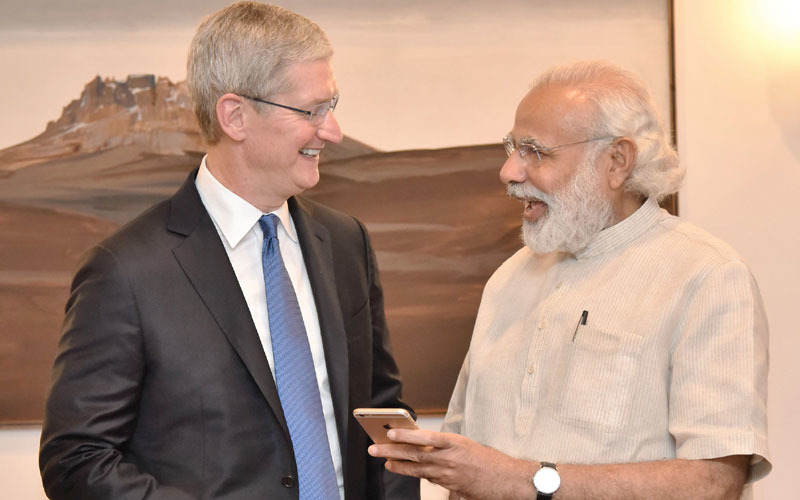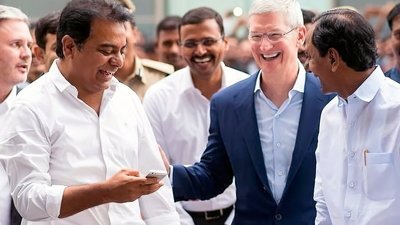The India government has refused Apple's request to exempt the iPhone from anti-spam laws regarding a mandatory anti-spam app, with the fight possibly ending up in the iPhone getting cut off from the country's cellular networks.
India's Telecom Regulatory Authority (TRAI) is demanding that Apple install an official anti-spam app. Anti-spam apps exist now with more coming online after iOS 12 — but India's official one demands access to the user's text message archive, and call logs.
Apple sent a letter to TRAI in mid-July about the matter, asking that India reconsider dropping noncompliant phones from the network. However, Apple's request was flatly denied by the group.
"The most appropriate way to challenge this is in court," TRAI Chairman R.S. Sharma told Reuters.
Sharma has recently been re-appointed to the post through 2020, so a change in leadership which could potentially solve the problem won't happen before the cutoff date.
The regulation
The new "Telecom Commercial Communication Customer Preference" regulation intends to cut down the number of nuisance or fraudulent calls in India, as well as unwanted marketing text messages and other spam. Part of the regulations overhaul is a requirement for carriers to allow customers to download a "Do Not Disturb" app to their devices to help combat spam, including reporting violations and setting subscription preferences for messages.
"Every access provider shall ensure, within six months' time, that all smart phone devices registered on its network support the permissions required for the functioning of such apps," the regulation states. "Provided that where such devices do not permit functioning of such apps, Access Providers shall, on the order or direction of the Authority, derecognize such devices from their telecom networks."
The regulation clearly mandates that Apple must provide access to the TRAI DND 2.0 app, or the regulator will order carriers in the country to remove iPhones from its network. As TRAI can directly regulate carriers but not device vendors, this is one of relatively few ways the regulator can try to penalize smartphone makers like Apple.
As it stands, the TRAI Do Not Disturb app violates several rules in the App Store. In March, Apple advised the app "violates the privacy policy" of the App Store, but insisted it was working with government engineers and discussing ways the app could be designed to "keep user's personal data safe."
Under the App Store rules, third-party apps are not allowed to see call logs or text messages, but are able to access saved contacts. Apple has previously advised it would not change policy in this case.
While Apple is refusing to allow the app to be used on iPhones in the country, the same cannot be said for other smartphone producers. The Do Not Disturb app has been available to Android owners since 2016.
Apple and India
India is an important country for Apple's growth, with the iPhone SE produced in the region for sale to the local market. In June, it was reported Apple had started commercial production of the iPhone 6s with local partner Wistron.
Apple is struggling to improve iPhone sales in the country, and recently lost three executives working in the country.
 Mike Wuerthele
Mike Wuerthele







-m.jpg)






 Amber Neely
Amber Neely
 Malcolm Owen
Malcolm Owen
 William Gallagher
William Gallagher

 Christine McKee
Christine McKee






-m.jpg)



30 Comments
I guess when you're in someone's house, you play by their rules.
Which includes going to court if Apple thinks their case is strong enough.
As in China money speaks louder than words. If Apple caves on this one too then Tim Cook’s bleating about privacy rings hollow. Stand your ground or take the money? You’ve already built a factory in India to placate the government. Which will it be, Mr. Cook? Why not just admit your privacy policies only work in mature Western democracies that have privacy rights in their constitutions? And even those are under attack in those democracies.
Note that IMO Apple does waffle a bit on "privacy" depending on the size of the market and the money to be made. In 2016 when China's government said Apple was going to be required to keep files on what AppStore apps an Apple customer downloaded or used and details about what how they used them, and all connected to the users real name and location, Apple said "Well okay then, we're good". Wasn't that violating Apple's standard privacy policies too? That's not even considering iCloud in China which is an entirely different level.
India is a small enough market for Apple to "take a stand for privacy" apparently.
You'll rarely if ever see me diss an Apple product. In general they make wonderfully designed and long lasting hardware. Support is industry leading, and even if Apple might not be 'first" with a feature or product they generally get it right. Like a lot of others I've bought a few Apple products over the years and currently still an Apple owner. I do have far less patience for what IMHO are clearly platitudes coming from them.
Ban India!
It’s too bad there are absolutists when it comes to views on Apple’s stance on privacy and other issues that are often treated differently in some countries. Apple doesn’t take the easy road, as Android apparently has on this demand by India. Absolutists won’t acknowledge that Apple will engage in these issues where others simply fold. And that’s exactly what Tim Cook has said all along.
Not a direct quote - I’m too lazy tonight to go find it - but he’s essentially said that ‘we don’t always agree with government policies in the countries in which we do business, but we feel it’s more productive to engage rather than take our ball and go home.’
To engage doesn’t mean to take a billigerent and uncompromising stance and fight until you win or until you can’t win and then take your ball and go home. To engage means to take a principled stance and argue for it in an attempt to persuade, and if you lose the fight you remain engaged so that you might have some influence down the road or on the next issue. You become seen as a principled voice of reason and an engaged partner with your adversaries. If you stick with it long enough, they might one day turn to you and ask, ‘what’s your advice on this upcoming proposed policy?’ A soft touch often has greater results than a hammer.